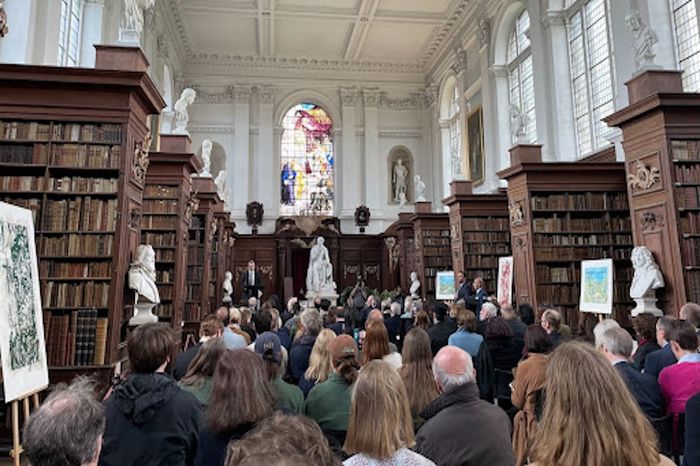Lord Byron’s freshers’ week
Ben Birch looks back at the great poet’s first week in Cambridge

“Dear Sir, I will be obliged to you to order me down 4 Dozen of Wine, Port – Sherry – Claret, and Madeira, one dozen of each.” – a young Lord Byron speaking to the bartender during his first and only trip to Vinyl in the freshers’ week of 1805.
You can trust the content and provenance of the quotation above because no one in history has ever returned to Vinyl after their first visit. How was your freshers’ week? Mine was, for the most part, an exercise in forgetting names and being frogmarched between Cambridge’s various nightlife establishments. The quote above is actually taken from one of Byron’s letters to his lawyer. He was seventeen at the time, on his way to Trinity College, and heartbroken to not be going to Oxford.
“My college master’s matriculation speech focussed on horse tranquilliser and online gambling”
A year on from matriculation, I can remember lining up wearing a gown with more holes than I had limbs so I could take a photo in which I was told by the photographer that I was smiling incorrectly. By contrast, Byron wrote that his “appearance in the Hall in my State Robes was Superb, but uncomfortable to my Diffidence.” Like Byron, you might find that it’s hard to feel comfortable in these superb situations. Post-matriculation, there is a fine image of young people sitting around candlelit tables, talking excitedly, and feeling like a part of history. The reality might be closer to being sat beside your college chaplain justifying why you chose French A-Level, trying to sound profound, and being scolded for incorrect port etiquette – that was my experience, anyway. The modern Cambridge experience is perhaps not as romantic as I had hoped it would be when I was a bright-eyed fresher. The post-matriculation speech given by the master of my college mainly focused on the dangers of snorting horse tranquilliser and online gambling rather than the figures of history who had passed through these halls before us. There was a certain aesthetic clash here as all this was being spoken from beneath a five hundred year old portrait of Henry VIII.
Byron attended the same college as me and his post-matriculation speech would’ve been given by William Hepworth Thompson – a man who I think bears a striking, if somewhat unfortunate, resemblance to both John Redwood and John Major. Thompson oversaw a rare progressive period for Trinity and is reported to have said, “we are none of us infallible, not even the youngest of us.” I think that line has a nicer touch to it than its modern equivalent.
“Byron’s time at university was his foray into radical politics”
Like many students, Byron’s time at university was his foray into radical politics. He joined the Cambridge Whig Club having been influenced by his friend John Cam Hobhouse. Despite this, it would be difficult to call him a party-political man. Years later, he wrote that he had simplified politics into “an utter detestation of all existing governments.” The modern equivalent of this would be showing your face at Pints and Policy once every two weeks in order to enjoy the provision of warm Carling. Byron’s friends were more often than not atheists, republicans, and/or homosexuals. His friend Charles Skinner Matthews was referred to as ‘Citizen’ which would be a Regency equivalent of ‘Comrade’. Matthews was openly atheistic and a republican – two dangerous views to hold so openly for a student in the nineteenth century. Even more dangerously, Matthews’ other nickname in Byron’s circle was ‘The Methodist’ – a not-so-subtle nod to his homosexuality.
Matthews drowned in the River Cam in 1811 – the first friend that Byron would lose to drowning before the death of Percy Shelley just eleven years later. None of this is to say that the man would’ve been a particularly good friend. A quote often flimsily attributed to him likens friends to quickly forgotten dancing partners in a waltz. Nonetheless, Byron’s Cambridge coterie was, in keeping with the rest of his life, deeply controversial. I think that’s something to aspire to, in some ways.
What people sometimes don’t understand when coming to university is that it is very difficult. When you leave, the university will record your time here as a final grade. In all my research on Byron for this article, I haven’t been able to find his final grade. As contrived as that may sound, it is important to think of what we are truly remembered for.
 Features / Should I stay or should I go? Cambridge students and alumni reflect on how their memories stay with them15 December 2025
Features / Should I stay or should I go? Cambridge students and alumni reflect on how their memories stay with them15 December 2025 News / Cambridge study finds students learn better with notes than AI13 December 2025
News / Cambridge study finds students learn better with notes than AI13 December 2025 News / Dons warn PM about Vet School closure16 December 2025
News / Dons warn PM about Vet School closure16 December 2025 Comment / The magic of an eight-week term15 December 2025
Comment / The magic of an eight-week term15 December 2025 News / News In Brief: Michaelmas marriages, monogamous mammals, and messaging manipulation15 December 2025
News / News In Brief: Michaelmas marriages, monogamous mammals, and messaging manipulation15 December 2025









